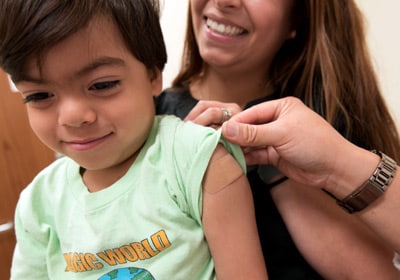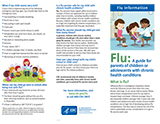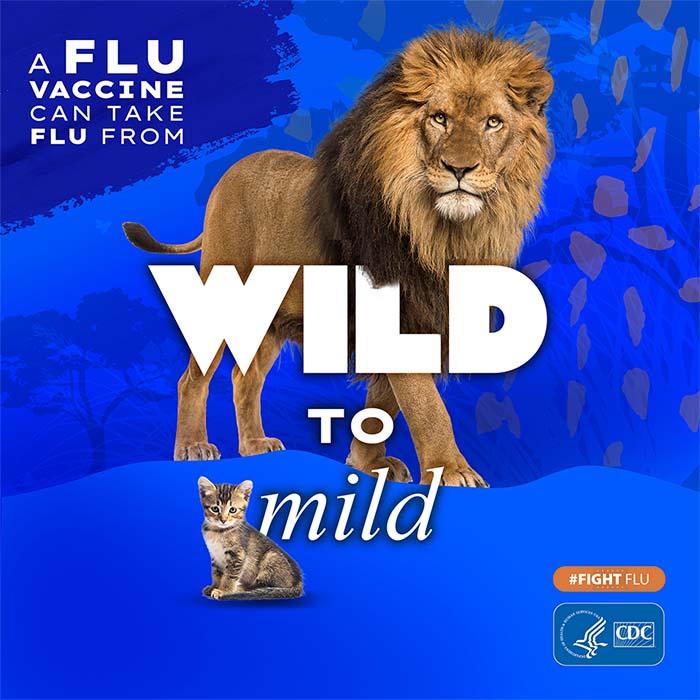Flu & Children with Neurologic Conditions

Children of any age with neurologic conditions are more likely than other children to become very sick if they get flu. Flu complications may vary and can include pneumonia and even death for some children.
Some children with neurologic conditions may have trouble with muscle function, lung function or difficulty coughing, swallowing, or clearing fluids from their airways. These are problems that can make flu illness worse.
Vaccination is the Best Protection against Flu
The best way to prevent flu and its potentially serious complications is for everyone 6 months and older to get a flu vaccine every year. It is especially important for children with neurologic conditions to get vaccinated since they are at a higher risk of experiencing complications if they become ill from flu.
Some children will need more than one dose of a flu vaccine to be protected. Your doctor can determine the number of doses your child needs to be protected against flu. Children younger than 6 months are too young to get a flu vaccine. Learn more about protecting infants against flu.
In children, annual flu vaccination has been shown to:
- Reduce flu illnesses, doctor’s visits for flu, and missed school days.
- Reduce the risk of flu-related hospitalization and death.
A 2017 study was the first of its kind to show that flu vaccination can significantly reduce a child’s risk of dying from influenza. The study found that flu vaccination reduced the risk of flu-related death by half (51 percent) among children with underlying high-risk medical conditions and by nearly two-thirds (65 percent) among healthy children. Additionally, it is important for close contacts of children with neurologic conditions, including parents, siblings, household members, and caregivers—such as babysitters, doctors, nurses, and teachers—to get vaccinated to keep from getting sick and possibly spreading flu to these children or other people at higher risk of serious flu complications. A full list of people for whom vaccination is especially important is available at Who Should and Who Should NOT Get a Flu Vaccine.
Types of Flu Vaccines for Children with Neurologic Conditions
Injectable influenza vaccines (or flu shots) are approved for use in children aged 6 months and older, including healthy children and children with chronic health problems.
- Disorders of the brain and spinal cord
- Cerebral palsy
- Epilepsy (seizure disorders)
- Stroke
- Intellectual disability
- Moderate to severe developmental delay
- Muscular dystrophy
- Spinal cord injury

The live attenuated influenza vaccine (LAIV), also known as the nasal spray vaccine, is recommended as an option for use in people 2 through 49 years old. The nasal spray vaccine is not recommended for pregnant people and for people with some chronic medical conditions. There is a precaution against the use of nasal spray flu vaccine (LAIV) in people with certain underlying medical conditions, including children with neurologic/neuromuscular disorders.
Your doctor or other health care provider can answer any questions you might have about flu vaccine.
Other Preventive Actions for Children with Neurologic Conditions
In addition to getting a flu vaccine, children with neurologic conditions should take the same everyday preventive actions that CDC recommends for everyone, including avoiding people who are sick, washing hands often, and covering coughs and sneezes. This also can include taking steps for cleaner air and hygiene practices like cleaning frequently touched surfaces. More information is available about core and additional prevention strategies.
Specific Health Actions for Children with Neurologic Conditions
- Health: Make sure that your child’s chronic health condition is under the best medical control possible.
- Plan: Have a plan for how to take care of your child in case they become sick with flu.
Symptoms and Treatment
Any person with a health condition that increases their risk for complications if they become sick with flu should get prompt medical attention if they have flu symptoms. If your child with a neurologic condition develops fever or flu symptoms, call your doctor or take them to the doctor right away. CDC recommends that doctors promptly treat flu illness in people who are at higher risk for severe flu complications because of have underlying medical conditions with flu antiviral drugs.
Flu symptoms include fever, cough, sore throat, runny or stuffy nose, body aches, headache, chills, and fatigue. Some people also may have vomiting and diarrhea, though this is more common in children than in adults. People may be infected with flu and have respiratory symptoms without a fever.
- Influenza antiviral drugs are medicines that fight against flu by keeping flu viruses from making more viruses in your body.
- Antiviral drugs can make your flu illness milder and make you feel better faster. They may also prevent serious health problems that can result from flu illness.
- Treatment with an influenza antiviral drug should begin as soon as possible because these medications work best when started early (within 48 hours after symptoms start).
- You need a prescription from a health care provider for an influenza antiviral medication.
- There are four FDA-approved flu antiviral drugs recommended by CDC this season that can be used to treat the flu.
- Keep your child at home when sick. You can go back to your normal activities when, for at least 24 hours, both are true:
- Your symptoms are getting better overall, and
- You have not had a fever (and are not using fever-reducing medication).*
- After these two criteria are met, there are some additional precautions that can be taken to protect others from respiratory illness. More information is available at About Preventing Spread of Respiratory Viruses When You’re Sick.
- *More information about how long people are contagious with flu and what to do if you did not have a fever is available at Flu: What To Do If You Get Sick | CDC.
- Make sure your child gets plenty of rest and clear fluids (water, broth, sports drinks, etc.). Your health care provider may also recommend fever-reducing medicines* based on your child’s age.
Learn more about the use of influenza antiviral drugs in children with neurologic conditions and other medicines for children when treating influenza.
*Children younger than 4 years old should not be given over-the-counter medicines without approval from a health care provider. Also, aspirin should not be given to any child younger than 18 years old who has flu.
People experiencing these warning signs should obtain medical care right away.
In children
- Fast breathing or trouble breathing
- Bluish lips or face
- Ribs pulling in with each breath
- Chest pain
- Severe muscle pain (child refuses to walk)
- Dehydration (no urine for 8 hours, dry mouth, no tears when crying)
- Not alert or interacting when awake
- Seizures
- Fever above 104 degrees Fahrenheit that is not controlled by fever-reducing medicine
- In children younger than 12 weeks, any fever
- Fever or cough that improve but then return or worsen
- Worsening of chronic medical conditions
In adults
- Difficulty breathing or shortness of breath
- Persistent pain or pressure in the chest or abdomen
- Persistent dizziness, confusion, inability to arouse
- Seizures
- Not urinating
- Severe muscle pain
- Severe weakness or unsteadiness
- Fever or cough that improve but then return or worsen
- Worsening of chronic medical conditions
These lists are not all inclusive. Please consult your medical provider for any other symptom that is severe or concerning.
A Flu Guide for Parents of Children or Adolescents with Chronic Health Conditions Brochure [687 KB, 2 pages]
Additional Resources for Caregivers of Children with Neurologic Conditions
- Influenza Vaccination in Children with Neurologic or Neurodevelopmental Disorders – Vaccine Journal article
- Flu Prevention in Children With Special Needs: A Call to Action (Medscape Commentary, password required)
- MMWR: Influenza Vaccination Practices of Physicians and Caregivers of Children with Neurologic and Neurodevelopmental Conditions — United States, 2011–12 Influenza Season
- Neurologic Disorders among Pediatric Deaths Associated with the 2009 Pandemic Influenza – Pediatrics Journal Article
- Letter to Health Care Providers [219 KB, 3 pages] Influenza vaccination of children with neurologic disorders
- Influenza Prevention and Control for Children and Youth with Special Health Care Needs – Clinician Outreach & Communication Activity (COCA) Conference Call, CE = Free Continuing Education

